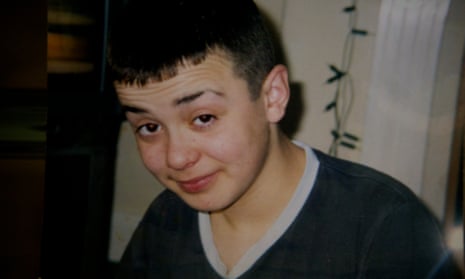In 2008, my son Jordan was convicted of a joint enterprise murder, along with two other teenagers. He was 15 at the time of the incident, and blind, with a visual acuity of less than 10%.
The victim died due to a single injury to the neck, a kick delivered by a 16-year-old, who confessed in the police station. Another boy, who was 18, pleaded guilty to manslaughter, accepting that if being part of the 30-second altercation with the victim contributed to his death, he would take responsibility. Jordan had an eye condition called keratoconus that was so severe he was scheduled for transplant surgery in both eyes. Given that my son could not have seen the altercation, or run away from it, and did not come into contact with the victim, I assumed it was a no-brainer that he would be let off.
The prosecutor, Michael Chambers QC, thought differently. He wanted all five of the boys who had been charged to be prosecuted under joint enterprise, a 300-year-old common law doctrine, which was controversially brought back into use under the guise of prosecuting gang violence. Instead, it has led to innocent people – many young, working-class and black and minority ethnic boys – facing mandatory life sentences for crimes committed by others, as was the case for Jordan and so many others like him.
On Friday, I heard a judge in another case at Newcastle crown court hand out life sentences to 10 children, totalling 124 years. There had been an 80-second altercation at Houghton Feast funfair in October 2021. An 18-year-old had died, tragically, from a single knife wound to the back. The wound was inflicted by a 15-year-old who was new to the area; the other nine defendants either didn’t know him or had only recently met him. There is no escaping who used the deadly weapon; he pleaded guilty to manslaughter. However, the prosecutor, Mark McKone QC, was adamant that all defendants were guilty of murder under the concept of joint enterprise; their presence and actions, even if relatively minor, “encouraged” the others in the group. I struggled to understand. Is there now a new definition of the law, whereby murder no longer requires intention or premeditation? That mere presence at the scene is enough to convict?
The judge clearly thought so, even when he dished out a life sentence with a tariff of 11 years to one of the children though, he acknowledged, there was “very little evidence of how he came to be at the scene” and he did not murder anyone. There are plenty of other charges that would have been more appropriate for the other nine defendants.
In June, I sat through part of a trial in Manchester, where 10 black youngsters ended up in prison for conspiracy to cause grievous bodily harm. The racism that played out in this case left my head spinning. The evidence was based on messages they sent to one another on the Telegram app after a friend had been murdered, and the youngsters having the audacity to make drill music as a way of expressing themselves. There was fury in Manchester and protesters took to the street. And rightly so – the Crown Prosecution Service is clearly not only institutionally racist but out of control.
I attended my son’s trial every single day bar one, and did not see any semblance of justice being played out. And then the verdict: I have never felt anger like it. We are supposed to see our justice system as the envy of the world, but what do we have to envy? Life sentences for murder for children who did not kill anyone?
In 2010, I met Gloria Morrison and we set up a grassroots organisation, JENGbA (Joint Enterprise Not Guilty by Association). Gloria’s son’s best friend was convicted of murder under joint enterprise and also given a life sentence. We could both see that the justice system was rigged – running roughshod over natural justice and turning innocent until proven guilty on its head.
In 2016, the supreme court acknowledged that the common law interpretation of joint enterprise had taken a “wrong turn” by the judiciary in 1984. It had been wrong to convict people of murder on the grounds that they had foreseen the possibility that someone could be killed. That meant we had a different fight – to quash existing convictions and these miscarriages of justice. But the supreme court ruling stated that “simply because the law applied has now been declared to have been mistaken” was not enough to hear the appeals of those convicted under the wrong interpretation of the law.
So I must ask you, the readers, to look at a child you know and love, your own child maybe, and imagine them, as my boy was, sitting shaking uncontrollably in a courtroom, trying his best to look dignified but failing miserably, being told he will never go home to the mother he loves and needs, for almost as long as he has been alive. And for what?
Janet Cunliffe is a co-founder of Joint Enterprise Not Guilty by Association
Do you have an opinion on the issues raised in this article? If you would like to submit a letter of up to 300 words to be considered for publication, email it to us at guardian.letters@theguardian.com
